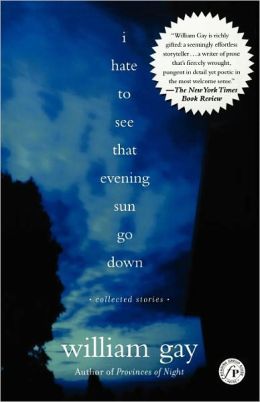Short Story Every Day: “Sugarbaby” from William Gay’s I Hate to See that Evening Son Go Down


“Sugarbaby” from William Gay’s collected stories, I Hate to See that Evening Son Go Down captures slow, unaffected degradation of a marriage in ways I’ve never read before. The main couple, Beasley, and let’s say, Martha (as part of the rules, I’m not allowed to go back to the story at all, and I can’t remember the wife’s name) are seen within their small community as a pillar of marital perfection. They’ve en-joyed/-dured marriage longer than any other couple. One day, Beasley buys his wife a dog, a small, yap-yap-yap kind of dog, who doesn’t seem to appreciate the fine home Beasley has brought him into. Eventually, Beasley shoots the dog with a gun far larger than would be necessary to kill such a tiny animal. This fact, though not directly addressed, is mentioned only enough to be allowed to simmer in the reader’s head. This is what makes a Gay story so perfect: small actions and tiny mannerisms imply tremendous consequences.
After a lifelong perfect marriage, Margaret suddenly abandons her husband. Beasley doesn’t react. This non-reaction is the impetus for an eventual divorce lawyer sent to Beasley’s house, a court supenona, and on and on the list goes, when really, Mildred never even tried to contact her husband after her split. This is where the reader is asked to pick a side. We choose Beasley because, yeah yap-yap dogs are terrible, and yeah, Megan should have given Beasley a phone call before sending in the law. What the fuck, Marge!
So the reader roots for Beasley, yeah, perhaps by default, as we aren’t allowed to see Melissa’s side of the story. And sure, eventually Beasley kills a cop and “escapes” to live on his own in the wilderness, primarily to avoid paying 50% cash to his wife in lieu of 50% of his property (the property deal having long been decided by Melody’s lawyer as no longer enough), but despite all of this, we actually still feel for Beasley. It makes me wonder if my loyalty would be different if Beasley shot a real dog like a Golden Retriever.
Rules for Short Story Every Day posts, designed to make me have to work as little as possible
- I’m not allowed to take notes as I read
- My commentary on each story should involve as little research as possible. I’m reacting to the story on a visceral level, not an intellectual level (though I reserve the right for overlap should my visceral mix with my intellectual)
- “Every Day” should be taken as the headline grabber it’s intended to be. I probably won’t


